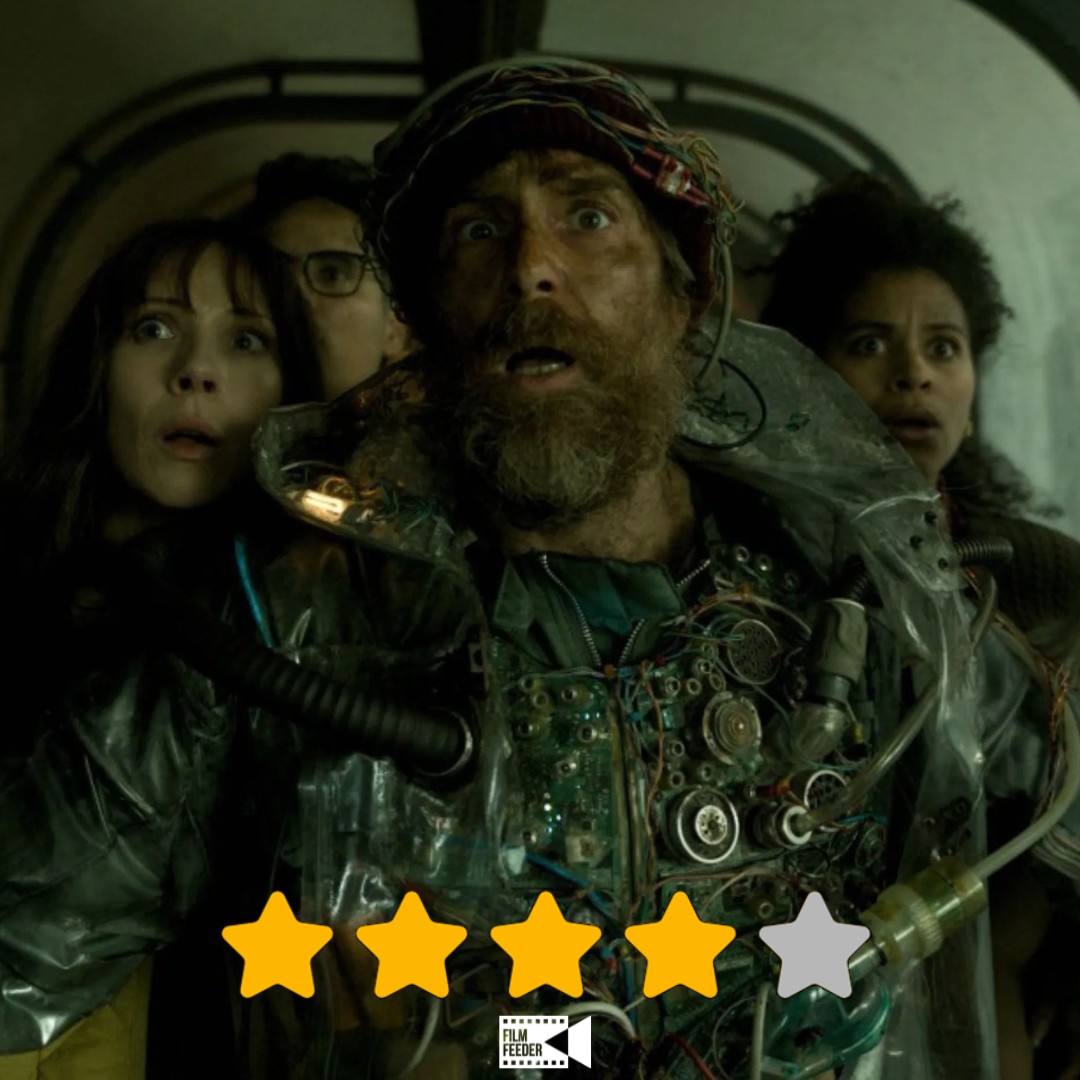
Tron: Ares (dir. Joachim Rønning)
Certificate: 12A
Running Time: 119 mins
UK Distributor: Disney
UK Release Date: 10 October 2025
WHO’S IN TRON: ARES?
Jared Leto, Greta Lee, Evan Peters, Hasan Minhaj, Jodie Turner-Smith, Arturo Castro, Cameron Monaghan, Gillian Anderson, Jeff Bridges, Sarah Desjardins
WHO’S BEHIND THE CAMERA?
Joachim Rønning (director), Jesse Wigutow (writer), Sean Bailey, Jared Leto, Steven Lisberger, Emma Ludbrook, Jeffrey Silver and Justin Springer (producers), Trent Reznor and Atticus Ross (composers), Jeff Cronenworth (cinematographer), Tyler Nelson (editor)
WHAT’S IT ABOUT?
A super-intelligent program (Leto) is sent from the digital world to ours for a bold mission…
WHAT ARE MY THOUGHTS ON TRON: ARES?
The Tron franchise has always caused more than a few bugs for Disney’s servers. While the 1982 original – groundbreaking at the time for its heavy use of then-new computer effects – is now regarded as a cult classic, it was initially met with tepid box office and mixed reviews, with most calling it an overly-ambitious experiment that didn’t quite live up to expectations. Disney would wait nearly thirty years to make the follow-up Tron: Legacy, but despite being (slightly) better received by critics and audiences, the film is best remembered for some iffy de-aging effects and, most importantly, Daft Punk’s incredible musical score.
Which leads us to Tron: Ares, the third film in the franchise that, once again, is arriving with dampened prospects for the studio. Beyond the fact that director Joachim Rønning’s standalone sequel is arriving fifteen years after the previous film, long after any appetite for another Tron movie has faded away, the presence of Jared Leto – whose private life and on-set behaviour has been heavily scrutinised as of late – is in and of itself a turn-off for audiences, regardless of whether or not they were ever excited about it.
But while Leto’s presence is discouraging, to say the least, Tron: Ares is the rare sequel that actually expands upon ideas that were only briefly touched upon in previous entries, and sometimes delivers on its deeper exploration within a visual style that is often striking. But if it’s much else you’re after, namely character development or emotional depth, you’ll come away with a greater sense of soullessness than the artificially intelligent programs in this very movie.
One of them is, of course, the titular Ares (Leto), a program that is designed to oversee the technological world created by Julian Dillinger (Evan Peters), in order to get ahead of his company’s biggest competitor ENCOM, whose incumbent CEO Eve Kim (Greta Lee) is searching for a “Permanence Code” within the systems she has inherited. Said code can effectively grant life to programs that can now be transferred from the digital world to ours, whereas currently they only last just under half an hour before disintegrating into nothingness. Needless to say, once Ares catches wind of such a thing, he is determined to acquire the code for himself and transcend from mere AI software into actual living tissue – which would make him kind of like a more algorithmic Pinocchio, albeit one who’s far less adorable as the artificial creation he begins existing as.
Oh, and in case you’re wondering if Garrett Hedlund and Olivia Wilde are going to make an appearance in what is effectively a direct sequel to Tron: Legacy – which given how that movie ended would make a whole lot of sense – cease wondering, because both are written to be out of the picture within minutes of the film starting. Although Jeff Bridges does make a cameo in this, as original protagonist Kevin Flynn, so at least they got one recurring Tron actor to make an appearance in a Tron movie (also, the actual character of Tron is nowhere to be found, not even a walk-on part for poor Bruce Boxleitner).
Instead, we’ve got Jared Leto, who in terms of charisma is far from Bridges or even Hedlund as you can imagine, and it really hurts the movie and especially its titular hero. The character of Ares honestly isn’t a terrible one, as he does have a consistent arc and displays flashes of quirkiness, like a savant-esque need to give the full definition of certain things like rain or the backstories of principal characters, and at one point delivers a monologue about how he prefers Depeche Mode over Mozart (make of that what you will, music snobs). The problem is that Leto’s performance brings none of the intrigue or gravitas that should come with such a protagonist, and comes across as a plank of dry, uninteresting wood most of the time, so there’s never a point where you’re invested in this character as much as you should be.
You’re far more invested in the neon-drenched style that director Rønning flaunts at every available opportunity, including CGI that is rather well rendered – thankfully, there’s none of that off-putting de-aging nonsense going on here – and a thumping techno score, this time provided by Trent Reznor and Atticus Ross (curiously credited as their band Nine Inch Nails here). It’s a very pretty movie, one that you can greatly admire from a visual aspect without needing to hear any of the pretty bad dialogue – which consists of a lot of stock movie lines like “Hang on!” during a chase sequence – though given how booming and often overwhelming the score is, chances are you probably won’t hear much of it anyway.
As for its ideas, it is cool seeing stuff like Lightcycles and the giant Recognizer ship function within real-world settings, and at one point we visit a world that very closely resembles the much blockier version from the 80s original, with Rønning doing well to visually replicate that charmingly dated CGI style. However, its lack of emotional connection with many of these characters – especially our lead – and the story being told renders them less impactful than they ought to be, at least from a conceptual standpoint. There’s never a point where you feel as though you’ve come to know any of them since they’re so one-note, whether they’re the irritating comic relief or a villain who could match Nicholas Hoult’s Lex Luthor in terms of bratty shouting matches, and while the imagery is striking it always feels empty since you are quite literally watching a lifeless computer at work, with not much personality or anything behind them.
More than any previous Tron movie, this one somehow feels the most ambitious and yet the emptiest of them all. It’s not a total disaster, for it is at least visually engaging a lot of the time, and it isn’t a sequel that’s simply following the narrative template of the other films, instead doing its own thing and building upon ideas that has previously been established. It’s a shame, though, that its lack of emotional engagement – largely due to its wildly miscast lead – leaves it ready to be derezzed.
SO, TO SUM UP…
Tron: Ares is a sequel that does attempt to expand upon ideas introduced in previous films, often to visually and audibly pleasing effect, but a severe lack of emotional engagement, much of it coming from a charisma-free turn by Jared Leto, hinders its potential to be a worthy follow-up.














0 Comments